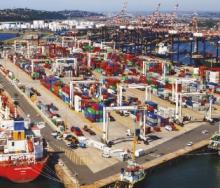Carriers take on plenty of risks. They are responsible for delivering the very shipments that keep their shipper customers in business. Any disruptions, including accidents, loss of cargo or financial woes, can create a supply chain disruption that damages reputations and decreases profits.
Based on the liability provisions provided by law and those found in the transport agreement, businesses may be held liable for damaged or lost cargo. The same applies for financial damages which are incurred by a customer, for example as a result a hijacking or an accident.
When a transportation company fails to put an effective transportation risk management solution in place, they communicate to their employees and customers that risk management is not a top priority. This can have a detrimental effect on morale, attracting conscientious drivers, and winning business. Many freight forwarders are now asking their carriers what policies are in place to reduce the risks that have the potential to impact their shipments. Without a concrete and clear risk management solution in place, one they can easily demonstrate to customers and define, freight forwarders will likely go elsewhere. They have too much at stake to take chances.
Companies that outsource the transportation of their products to a professional carrier or freight forwarder often mistakenly believe that the service provider is fully liable for any damage. In the unfortunate event that any problems do occur, they are presented with a terms and conditions document that is impossible for non-legal persons to understand. In this article, we explain what you need to consider, the most common risks linked to the transportation of goods, and when to arrange insurance cover to mitigate a portion of or the entire risk.
The five most important considerations are:
1. Liability and Incoterms
The Incoterm used in the “shipping” of the product will state who is liable for any loss or damage - whether it is through mistakes or negligence. There should also be caps to the carrier’s or freight forwarder’s liability and the maximum compensation to be paid.
2. Freight forwarders and carriers
A carrier is a company that physically transports the goods. A freight forwarder is an intermediary that arranges transport on behalf of its customers. Therefore, a freight forwarder is only partially liable if something goes awry.
3. Understand the value of your shipments
If the value of the consignment is higher than the maximum amount for which the carrier or the freight forwarder is liable, then it is wise to enquire about GIT insurance. GIT insurance cover may not be a legal requirement, but for any carrier, it really is a must. The logistics industry is incentivised to fill the trailer cube, without considering the risk profile.
4. Partner with an insurance professional who understands supply chain issues and can help develop a risk management plan. Work with an expert to understand the best options to cover any gaps.
5. Partner with a logistics attorney who will create a risk management solution to incorporate all contingencies to mitigate any and all risks. Don’t avoid risk, rather opt for legal risk management.
Contracts between the carrier, freight forwarder and their customers or service providers, including supplements, appendices and tariffs, are becoming more prevalent in order to mitigate the most risk and limit liability. These contracts must specifically address every aspect of the business operation.
So what about the contractual relationship with a subcontractor?
In the current business world, being a contractor or subcontractor is fraught with legal issues. Every time you sign a contract as either the principal or a subcontractor, you are exposing yourself to significant risk. The “arms-length” relationship with the subcontractor must be recorded in an agreement with indemnification. This means eliminating or minimising the impact of such exposure. The party needs to carefully review the contract they are about to sign or the contract their attorney has drafted to ensure that it is easy to understand, and complies with the law.
However, in practice this does not often occur. Most carriers fail to realise that whatever mitigation of risk and limits of liability they have signed up with the freight forwarder, these need to be mirrored in the sub-contractor’s agreement.
In this instance, a carrier cargo liability policy is a third-party liability policy that provides cover to the carrier of the goods and the subcontractor. Both parties are able to insure any acts of negligence, whether gross negligence or common-law negligence, for loss or damage to third-party property if the cargo owner is enforcing a claim against the carrier
The insurable interest arises from any liability that is defined in the insurance policy that may cause damage to a customer’s property while transporting it - the emphasis being: while the customer’s property is in the carrier’s or its approved sub-contractors’ care, custody or control. It indemnifies the carrier and not the owner of the goods.
Cargo carriers need to be cognisant of the fact that a private and independent commercial contract between themselves and a cargo owner translates into no cover for consequential losses through an insurer. Although legal liability goods-in-transit cover has been around for many years, the difficulty lies in the fact that most insurers offer policies on a strict legal liability basis. Losses will only be settled if it can be proven that the loss/damage directly resulted from gross negligence by the carrier, not providing the carrier with an optimal solution.













